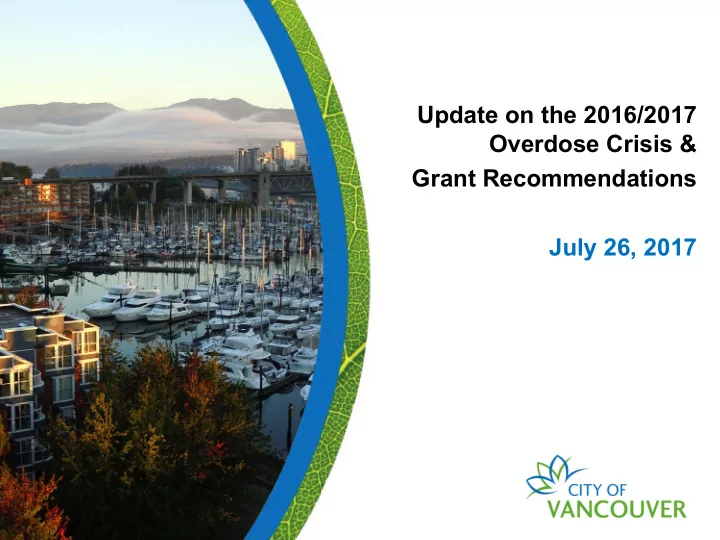

Update on the 2016/2017 Overdose Crisis & Grant Recommendations July 26, 2017
Overview 1. Background 2. City Response to date 3. Priority Needs and EOI 4. Recommended Grants 2
Background 3
Background on Opioid Crisis: 2016 • Province declared public health emergency on April 14, 2016 • Unprecedented total of 967 overdose deaths in 2016 in BC • 228 deaths in Vancouver alone • 4,709 Vancouver Fire and Rescue Services (VFRS) response calls to overdose incidents in 2016
Key Statistics for 2017 • Est. 216 overdose deaths in Vancouver between January 1 and July 16* • 88% occurred inside • 82% male • 3886 VFRS calls from Jan 1 to July 16 (83% of calls in 2016) *Awaiting confirmation from BC Coroner toxicology reporting
Impact on Vancouver Fire & Rescue VFRS Monthly Overdose Calls Jan 1, 2014 – July 16, 2017 2014 2015 2016 2017 900 800 700 600 500 400 300 200 100 0 Jan Feb Mar Apr May Jun Jul Aug Sep Oct Nov Dec
Overdose Deaths in Vancouver: 2007 – July 16, 2017 Overdose Deaths in Vancouver 2007 – July 16*, 2017 250 228 216 200 150 136 100 101 80 69 65 60 59 50 42 38 0 2007 2008 2009 2010 2011 2012 2013 2014 2015 2016 2017 Source of Data: BC Coroner and VPD
Getting Results: Interventions are Saving Lives
Coordinated City Response 9
Update on Previously Approved Coordinated Response • December 2016: One-time 0.5% property tax approved by Mayor and Council, providing $3.5M to address impacts on the city • Close partnership with Vancouver Coastal Health, BC Housing, community (“first” first responders), VFRS, VPD, and academic partners • Monitoring and reporting weekly data through collaboration with VPD, VFRS, and VCH • $2.5M investments in additional VFRS staff and community safety
Update on Previously Approved $220,000 • Coordinated Peer Based initiatives: - Spikes on Bikes: 700 more residents have naloxone training; 63,000 used needles picked up - Tenant Overdose Response Organizers (TORO): 370 residents in private SROs trained in naloxone – Atira’s Women-only supervised site: world’s women’s only peer guided site – PHS’ Rainier wellness program
Update on Previously Approved Coordinated Response • $30,000 for peer capacity and support • $100,000 for de-stigmatization, guided by People With Lived Experience Advisory Committee
Update on Previously Approved Coordinated Response • $60,000 for Ray-Cam’s wrap- around youth service • $10,000 for community naloxone training – Over 300 people trained in naloxone
Five Priority Needs and EOI 14
Process to Identify Funding Recommendations • Community consultation and data monitoring – Healthy City for All Leadership Table – People with Lived Experience – Partners in community and health
Process to Identify Funding Recommendations Five priority needs: 1. Innovative anti-stigma programs 2. Building capacity with urban Aboriginal communities 3. Addressing social isolation of people that use drugs 4. Addressing toxic, illicit drug supplies 5. Expanding interventions beyond the DTES
Recommended Funding & Strategic Alignment Total Recommended $601,800 Leveraged Resources from Over $1,076,000 Partners • May 26, 2017: call for expressions of interest • June 9: 25 proposals received • Staff liaised with 16 organizations to develop full proposals • All projects address multiple priority needs • Projects align with: – Healthy City Strategy – City of Reconciliation & Truth and Reconciliation Commitments – Downtown Eastside Plan 17
Recommended Grants 18
1. Four Innovative Anti-Stigma Programs Recommended total of $116,600 to: • Canadian Association of People who Use Drugs • Frog Hollow Neighbourhood House • Lookout Emergency Aid Society • Megaphone Magazine 19
2. Six Urban Aboriginal Community Capacity Building Programs Recommended total of $265,070 to : • Metro Vancouver Aboriginal Executive Council • Native Education College • PACE Society • PHS Community Services Society • Vancouver Aboriginal Community Policing Centre • Western Aboriginal Harm Reduction Society 20
3. Two Projects Address Social Isolation of Drug Users Recommended total of $68,200 to : • Lookout Emergency Aid Society – Expanded Support for Mt Pleasant Shelter • RainCity Housing and Support Society – Expanded peer-run witnessing rooms 21
4. Three Projects to Address Toxic Drug Supplies Recommended total of $128,930 to : • BC Centre on Substance Use • Overdose Prevention Society • PHS Community Services Society Source: VCH 22
5. Expanding Beyond the DTES Recommended total of $23,000 to : • WISH Drop-in Centre Society • One of 8 recommended projects that engage residents across the City 23
Next Steps • Evaluation and monitoring of funded projects • Continue advocacy with new Ministry of Mental Health and Addictions, Federal Ministry of Health • Coordinate ongoing efforts with community, VFRS, VPD, VCH • Weekly overdose data monitoring 24
Thank You 25
Honouring Tracey Morrison Tracey Morrison, President of Western Aboriginal Harm Reduction Society, and member of the People with Lived Experience Advisory on Mental Health and Addiction, passed away on July 14 th . The community mourns the loss of a courageous leader in drug policy, mental health and Aboriginal healing and wellness. The City acknowledges Tracey’s commitment to ending the overdose crisis and making the community healthier for all. 26
Questions? 27
Recommend
More recommend